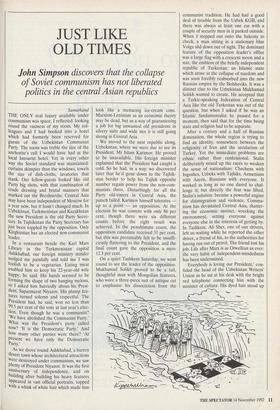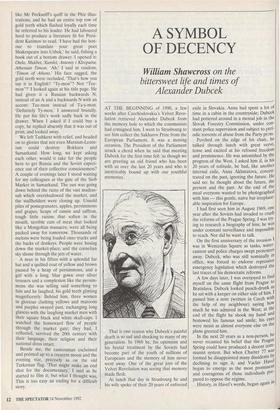JUST LIKE OLD TIMES
John Simpson discovers that the collapse of Soviet communism has not liberated politics in the central Asian republics
Samarkand THE ONLY real luxury available under communism was space, I reflected, looking round the vastness of my room. My col- leagues and I had booked into a hotel which had formerly been reserved for guests of the Uzbekistan Communist Party. The room was treble the size of the anchorite's cell I would have had at the local Intourist hotel. Yet in every other way the Soviet standard was maintained: curtains skimpier than the windows, towels the size of dish-cloths, lavatories that stank. Our fellow-guests looked like old Party big shots, with that combination of crude dressing and brutal manners that marked out the Brezhnevite. Central Asia may have been independent of Moscow for a year now, but it hasn't changed much. In Uzbekistan, Turkmenistan and Kazakhstan the new President is the old Party Secre- tary. In Tajhikistan the Party Secretary has just been toppled by the opposition. Only Kirghizstan has an elected non-communist leader.
In a restaurant beside the Karl Marx Library in the Turkmenistan capital Ashkhabad, our foreign ministry minder nudged me painfully and told me I was foolish to be a vegetarian. Eating meat enabled him to keep his 22-year-old wife happy, he said. His hands seemed to be forming the shape of two hanging melons, so I asked him hurriedly about. his Presi- dent, Saparmurat Niyazov. His plump fea- tures turned solemn and respectful. The President had, he said, won no less than 99.5 per cent of the vote at last year's elec- tion. Even though he was a communist? We have abolished the Communist Party.' What was the President's party called now? 'It is the Democratic Party.' And how many other parties were there? 'At present we have only the Democratic Party.'
As we drove round Ashkhabad, a barren desert town whose architectural attractions were destroyed under communism, we saw plenty of President Niyazov. It was the first anniversary of independence, and on building after building his heavy features appeared in vast official portraits, topped with a whisk of white hair which made him look like a menacing ice-cream cone. Marxism-Leninism as an economic theory may be dead, but as a way of guaranteeing a job for big unwanted old presidents in silvery suits and wide ties it is still going strong in Central Asia.
We moved to the next republic along, Uzbekistan, where we were due to see its President, Mr Islam Karimov. He proved to be unavailable. His foreign minister explained that the President had caught a cold. So he had, in a way: we discovered later that he'd gone down to the Tajhik- stan border to help his Tajhik opposite number regain power from the non-com- munists there. Disturbingly for all the Party old-timers in Central Asia, the putsch failed. Karimov himself tolerates up to a point — an opposition. At the election he was content with only 86 per cent, though there were six different counts before the right result was achieved. In the penultimate count, the opposition candidate received 31 per cent, but this was presumably felt to be insuffi- ciently flattering to the President, and the final count gave the opposition a mere 12.3 per cent.
On a quiet Tashkent Saturday, we went round to see the leader of the opposition. Mukhamad Solikh proved to be a tall, thoughtful man with Mongolian features, who wore a three-piece suit of antique cut to emphasise his dissociation from the communist tradition. He had had a good deal of trouble from the Uzbek KGB, and there was always at least one car with a couple of security men in it parked outside. When I stepped out onto the balcony to check, a man sitting in a stationary blue Volga slid down out of sight. The dominant feature of the opposition leader's office was a large flag with a crescent moon and a star, the emblem of the briefly independent republic of Turkestan: an Islamic state which arose at the collapse of tsardom and was soon forcibly reabsorbed into the new Russian empire by the Bolsheviks. It was a distinct clue to the Uzbekistan Mukhamad Solikh wanted to create. He accepted that a Turkic-speaking federation of Central Asia like the old Turkestan was out of the question, but when I asked if he was an Islamic fundamentalist he paused for a moment, then said that for the time being state and religion had to be separate.
After a century and a half of Russian domination, the whole region is trying to find an identity, somewhere between the religiosity of Iran and the secularism of Turkey. Yet the immediate problems are ethnic rather than confessional. Stalin deliberately mixed up the races to weaken the sense of nationalism: Chechens with Ingushes, Uzbeks with Tajhiks, Armenians with Azeris, Russians with everyone. It worked as long as no one dared to chal- lenge it; but directly the fear was lifted, Stalin's solution became a powerful engine for disintegration and violence. Commu- nism has devastated Central Asia, shatter- ing the economic instinct, wrecking the environment, setting everyone against everyone else in the interests of getting by. In Tashkent, Ali Sher, one of our drivers, left us waiting while he reported the other driver, a friend of his, to the authorities for having run out of petrol. The friend lost his job. Life after Marx is as Orwellian as ever: the very habit of independent-mindedness has been undermined.
`Everybody is loving our President,' con- fided the head of the Uzbekistan Writers' Union as he sat at his desk with the bright red telephone connecting him with the minister of culture. His dyed hair stood up
like Mr Pecksniff's quiff in the Phiz illus- trations, and he had an entire top row of gold teeth which flashed loyally each time he referred to his leader. He had laboured hard to produce a literature fit for Presi- dent Karimov to read. 'I have had the hon- our to translate your great poet Shakespeare into Uzbek,' he said, fishing a book out of a bottom drawer. I opened it: Otelo, Makbet, Xamlet, Antoniy i Kleopatra, Athenian Timon. `Ah,' I said at random, `Timon of Athens.' His face sagged, the gold teeth were occluded. 'That's how you say it in English? "Ty-mon"? Not "Tee- mon"?' I looked again at his title page. He had given it a Russian backwards N, instead of an A and a backwards N with an accent: Tee-mon instead of Ta-y-mon. `Definitely Ty-mon,' I answered brutally. He put his life's work sadly back in the drawer. When I asked if I could buy a copy, he replied absently that it was out of print, and looked away.
We left Tashkent with relief, and headed on to glories that not even Marxism-Lenin- ism could destroy: Bokhara and Samarkand. How long, we kept asking each other, would it take for the people here to get Russia and the Soviet experi- ence out of their collective consciousness? A couple of evenings later I stood waiting for my colleagues at the gate of the Siob Market in Samarkand. The sun was going down behind the ruins of the vast madras- sah which overshadowed the market, and the stallholders were closing up. Unsold piles of pomegranates, apples, persimmons and grapes, heaps of cumin and saffron, tough little raisins that soften in the mouth, terrible cuts of meat that looked like a Mongolian massacre, were all being packed away for tomorrow. Thousands of melons were being loaded onto trucks and the backs of donkeys. People were hosing down the market-place, and the cornelian sky shone through the jets of water.
A man in his fifties with a splendid fur hat and a quilted coat of yellow and brown paused by a heap of persimmons, and a girl with a long, blue gown over silver trousers and a complexion like the persim- mons she was selling said something to him and he laughed, his gold teeth glinting magnificently. Behind him, three women in glorious clashing yellows and maroons and purples swayed past, exchanging long glances with the laughing market men with their square black and white skull-caps. I watched the homeward flow of people through the market gate; they had, I reflected, survived the 20th century with their language, their religion and their national dress intact.
Beside me, the cameraman exclaimed and pointed up to a crescent moon and the evening star, precisely as on the old Turkestan flag. 'That might make an end shot for the documentary,' I said as he started to film it; but what I thought was, This is too easy an ending for a difficult story.



































































 Previous page
Previous page